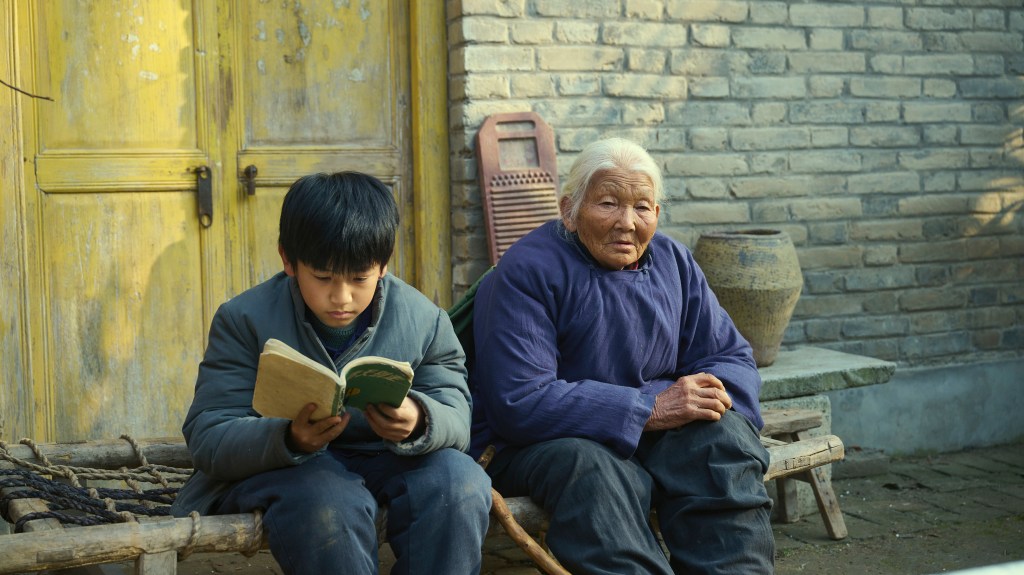A farming family in rural China gets a rich, warm portrait in Huo Meng’s picturesque second feature Living the Land, set in the early 1990s in a country on the cusp of vast change. Rather than a static tribute to the countryside, Huo’s lovely roving eye for composition and gentle hand with drama trace the challenges and enduring bonds among several hard-working generations of farmers.
The parents of sweet 10-year-old Chuang (Wang Shang) left him at birth with their clan (the Li’s) in order to seek jobs south in Shenzhen. The village will undergo shifts of its own, but an early sequence of burial and mourning rituals around their grandparents underlines the traditions that still hold sway, with public laments and white mourning hats. There’s an omnipresent drive to keep tending to the wheat and cotton harvests that are the Li livelihood, requiring days and nights of labor and attention.
Huo captures the spirit and good humor of the extended family, whether it’s a salty great-grandmother (Zhang Caixia) or Chuang’s 21-year-old aunt, Xiuying (Zhang Chuwen), who is being pushed into a marriage with a richer family’s son. You can practically smell the earth in the swaying fields, and the camera gives a dynamic feel for the gatherings and bustling byways of their small community. Considerable care has clearly been taken to replicate the quilts, jackets, pots, and so on, that a family of the time might use, and Huo’s casting also draws upon people who weathered the era.
The four seasons set the shape of the broadly episodic film, which elegantly links life events (each with rituals with colors that suddenly pop) without pushing a single storyline. Chuang’s aunt Xiuying helps her sister (who is already pregnant with a forbidden third child) by showing up for her family-planning appointment, an experience that comes up again later when she is married. Chuang nurtures close bonds with Xiuying and their great-grandmother, who takes a shine to the boy. He ends up serving as witness to the travails of both women, each of whom faces a world all too ready to put them in their place — in contrast to Huo’s previous feature, Crossing the Border: Zhaoguan, which centered on male experience.
The Communist Party remains a force in the village, but the local party leader also has a rapport with the Li family whereby deals can be struck (as in the case of the family planning issue). The incredible upheaval of China under past decades of Communism is not a distant memory: one lonely bachelor hails from a formerly wealthy family in the area, presumably before collectivization. When people gather around a boxy TV set at one point to catch a soap opera, the show bears the monolithic-sounding title The Women Migrant Workers. And as hard as life is now, an execution bullet found in a Li grandfather’s grave reminds of even tougher times.
A new tiny tractor signals that technological changes are on the way, though there’s also more talk of seeking work in Shenzhen. But the biggest change agent will be the Chinese state, which flexes its muscles with a survey for oil in the fields that pockmarks the farmland with explosions. The turmoil is not on the scale of the Three Gorges Dam Project memorably dramatized by Jia Zhangke (an early Huo Meng supporter) in Still Life (2006), but the farmers might soon become factory workers if national industry demands something different from their land.
Throughout, Chuang’s viewpoint reflects a fondness for the community and a necessary patience for the recurrent frustrations of village life. The boy’s sensitivities — and love of reading — mark him out for a different path than the field work of his forefathers. He in turn sympathizes with a troubled relative, Jihua, whose intellectual disabilities lead to friction, bullying, and beatings from a family member. (These scenes can be uneasy to watch; later, the film’s most uncomfortable scene involves a pig and a knife.)
The stories unfold with a certain inevitability, as life events move ever onward, and the occasional reverberating score almost sound like the turning of the earth. Some material has the feel of family lore and anecdotes, like the hidden romance that is implied when Chuang delivers his aunt’s letter at night to a teacher who’s leaving town, or the clearly little-loved school practice of asking students to bring a load of wheat to class after harvest season. But Huo concludes with a suitably epic frame that, like the film, is both familial and effortlessly historical in scope.
Title: Living the Land (Sheng Xi Zhi Di)
Festival: Berlin (Competition)
Director-screenwriter: Huo Meng
Cast: Wang Shang, Zhang Yanrong, Zhang Chuwen, Zhang Caixia
International sales: m-appeal
Running time: 2 hr 12 mins



